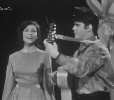Land, my land, |
Adama, ademati |
אדמה אדמתי | |||||||
| |||||||||
|
| |||||||||
| Land, my land, | ’Adama, ’ademati, |
אֲדָמָה-אַדְמָתִי, | |||||||
| Beloved until my death, | Rehuma ‛ad-moti, |
רְחוּמָה עַד-מוֹתִי, | |||||||
| A strong wind has boiled your dryness, | Ruah rav harbonayikh hirtiyah, |
רוּחַ רַב חַרְבוֹנַיִךְ הִרְתִּיחַ, | |||||||
| A strong wind has boiled. | Ruah rav hirtiyah. |
רוּחַ רַב הִרְתִּיחַ. | |||||||
| You are engaged with me by blood, | ’Érastikh li be-dam |
אֵרַשְׂתִּיךְ לִי בְּדָם | |||||||
| That reddened and dried up | Shè-’adam ve-nadam, |
שֶׁאָדַם וְנָדַם | |||||||
| On the hills of Sheykh Abreyk and Hartiya! | ‛Al giv‛ot Sheykh ’Abréyk ve-Hartiya! |
עַל גִּבְעוֹת שֵׁיח' אַבְּרֵיק וְחַרְתִּיָּה! | |||||||
| Dancing waves | Ha-mahol be-galim |
הַמָּחוֹל בְּגַלִּים | |||||||
| Form circles. | Ye‛agel ‛igulim |
יְעַגֵּל עִגּוּלִים. | |||||||
| Wake up sun, forever I've chosen over H'artiya, | ‛Uri shèmèsh – la-‛ad be-Hartiya |
עוּרִי, שֶׁמֶשׁ, לָעַד בְּחַרְתִּיָּה | |||||||
| Wake up sun over H'artiya! | ‛Uri shèmèsh be-Hartiya! |
עוּרִי, שֶׁמֶשׁ, בְּחַרְתִּיָּה! | |||||||
| Through days and nights | Be-yomi ve-leili |
בְּיוֹמִי וְלֵילִי | |||||||
| My labor is my grace | Li yéhod ‛amali, |
לִי יֵהוֹד עֲמָלִי | |||||||
| On the hills of Sheikh Abreik and Hartiya!) | ‛Al giv‛ot Sheykh ’Abréyk ve-Hartiya! |
עַל גִּבְעוֹת שֵׁיח' אַבְּרֵיק וְחַרְתִּיָּה! | |||||||
| Here, olive tree tops | Kan tsamrot ha-zéytim |
כָּאן צַמְּרוֹת הַזֵּיתִים | |||||||
| Sing: "It's my home!" | Mezamrot: zè béyti! |
מְזַמְּרוֹת: זֶה בֵּיתִי, | |||||||
| Each stone whispers: "I acknowledge him!" | ’Èvèn ’èvèn tilhash: hikartihu, |
אֶבֶן-אֶבֶן תִּלְחַשׁ: הִכַּרְתִּיהוּ, | |||||||
| Whispers: "I acknowledge him!" | Tilhash: hikartihu! |
תִּלְחַשׁ: הִכַּרְתִּיהוּ. | |||||||
| Give birth, my mother! | Hèra, hora shèli! |
הֶרָה, הוֹרָה שֶׁלִּי, | |||||||
| My crops ripen, | Yevulay mavshilim, |
יְבוּלַי מַבְשִׁילִים | |||||||
| On the hills of Sheikh Abreik and H'artiya! | ‛Al giv‛ot Sheykh ’Abréyk ve-Hartiya! |
עַל גִּבְעוֹת שֵׁיח' אַבְּרֵיק וְחַרְתִּיָּה! | |||||||
| With a flaming oath | Bi-shvu‛a lohata |
בִּשְׁבוּעָה לוֹהֲטָה | |||||||
| You are captive of mine now. | ’At shvuya li ‛ata. |
אַתְּ שְׁבוּיָה לִי עַתָּה. | |||||||
| This heart shall not be dettered of its vow, | Zè ha-lév ’èt nidro lo yartiya‛ |
זֶה הַלֵּב אֶת נִדְרוֹ לֹא יַרְתִּיעַ, | |||||||
| This heart shall not be deterred. | Zè ha-lév lo yartiya‛ |
זֶה הַלֵּב לֹא יַרְתִּיעַ. | |||||||
| Since he ordered me freedom, | Ki tsivani hérut |
כִּי צִוַּנִי חֵרוּת | |||||||
| The common man, | Ha-’adam ha-pashut, |
הָאָדָם הַפָּשׁוּט | |||||||
| On the hills of Sheikh Abreik and H'artiya! | ‛Al giv‛ot Sheykh ’Abréyk ve-Hartiya! |
עַל גִּבְעוֹת שֵׁיח' אַבְּרֵיק וְחַרְתִּיָּה! | |||||||
On the hills of Sheikh Abreik, also called from its first words Adama, ademati, is a poem written in 1941 by Alexander Penn with music from Mordekhaï Zeïra, in memory of Alexander Zaïd who was killed there on July 10, 1938.


